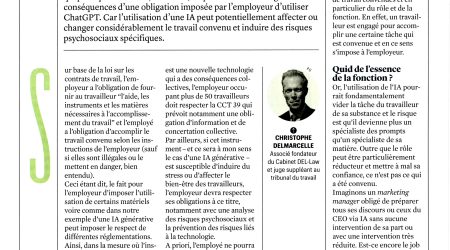Can a meeting be recorded without the participants knowing?
Posted the 22 November 2018An employee is summoned for a meeting with his employer. Can he record the conversation without his knowledge as proof?
With our smartphones, it is easy to record or even film someone without their knowledge. The temptation can be strong to keep evidence of a conversation in order to defend one's rights. To assess the validity of this process, three steps must be considered.
On one hand, account must be taken of Article 314 bis of the Penal Code, which prohibits intentionally recording a communication not intended for the public. However, this provision does not apply to those who participate in the communication. The Court of Cassation confirmed this in a judgment of November 17, 2015: anyone who participates in a communication and records it—even without the knowledge of other participants—does not commit a criminal offense.
Taking Circumstances into Account
On the other hand, the legality of the process must also be assessed in light of the provisions ensuring the protection of privacy, notably Article 8 of the European Convention on Human Rights and Article 22 of the Constitution, which guarantees the right to privacy, as well as the European General Data Protection Regulation (GDPR). In its 2015 ruling, the Court of Cassation emphasized that this assessment should be made by considering the legitimate expectations of the person regarding privacy. This assessment must be done on a case-by-case basis and depending on the circumstances. For example, a premeditated, planned recording will be considered dishonest and more intrusive to privacy. The same applies if it takes place in a private or semi-private setting, which is more severely assessed than if it happens in a public space. Similarly, a recording in an office will be more harshly judged than one made in the company cafeteria or courtyard. The existence of a dispute will also make the intrusion more serious. The way the recording is organized (preparatory maneuvers, observations, etc.) can also have an impact.
No Out-of-Context Excerpts
Finally, even if the use of a secret recording is deemed illegal due to the violation of privacy, it does not automatically mean that it cannot be presented as evidence in court. In fact, contrary to the previous case law which automatically rejected all evidence obtained unlawfully (and even applied the "domino" principle, meaning that evidence obtained illegally "tainted" all subsequent evidence), the Court of Cassation, in two rulings, one in criminal matters (June 9, 2004) and one in civil matters (the "Antigone" ruling of March 10, 2008), confirmed that the judge could accept the production of unlawful evidence when it is not tainted by a defect detrimental to its credibility (e.g., a planned recording in a closed space with prepared and leading questions) or violating the principle of a fair trial (e.g., presenting selected excerpts without the rest of the recording).
Unevenly Applied Case Law
The "Antigone" case law was validated by the European Court of Human Rights (July 29, 2009) and the Constitutional Court (December 22, 2010). However, it is not consistently applied by our courts and tribunals. For example, while the Liège Labor Court has repeatedly accepted the admissibility of a recording made without the person's knowledge, as have courts in Charleroi and Ghent, the Brussels Labor Court tends to systematically reject it.
If it is not possible to secure evidence otherwise, the employee or employer will be advised to record the conversation but be aware that they may not be able to use it and should, if possible, take precautions to reduce the risk of rejection (such as not premeditating the recording, turning it into a trap, making it in a public place, presenting the entire recording, etc.). And they should not forget that the other party can do the same...
Related articles

Is an employer allowed to mandate the use of artificial intelligence tools by employees ? (Trends, 17-07-2025)

Caution if a former colleague opposed to your employer asks you to testify in their favor
